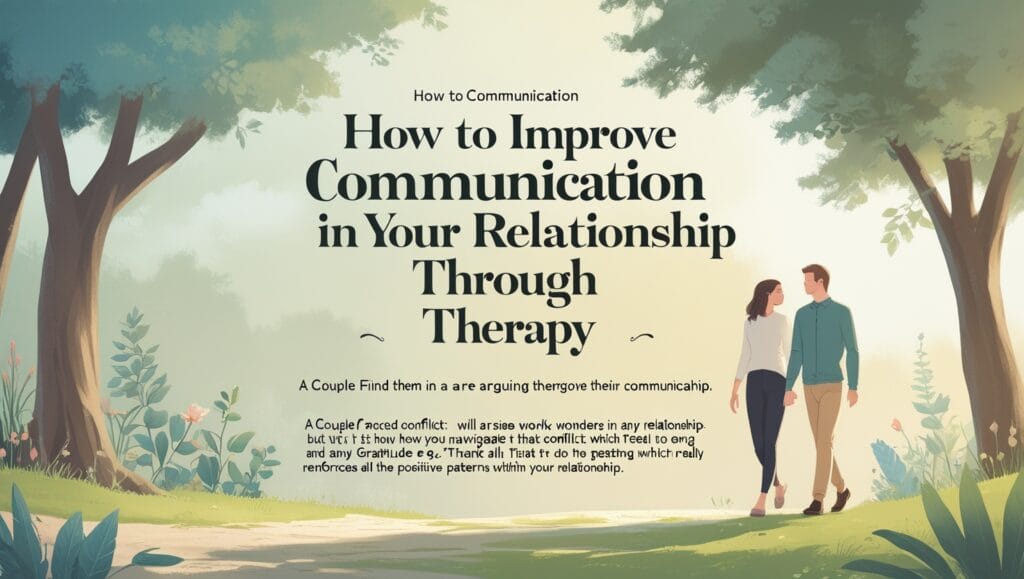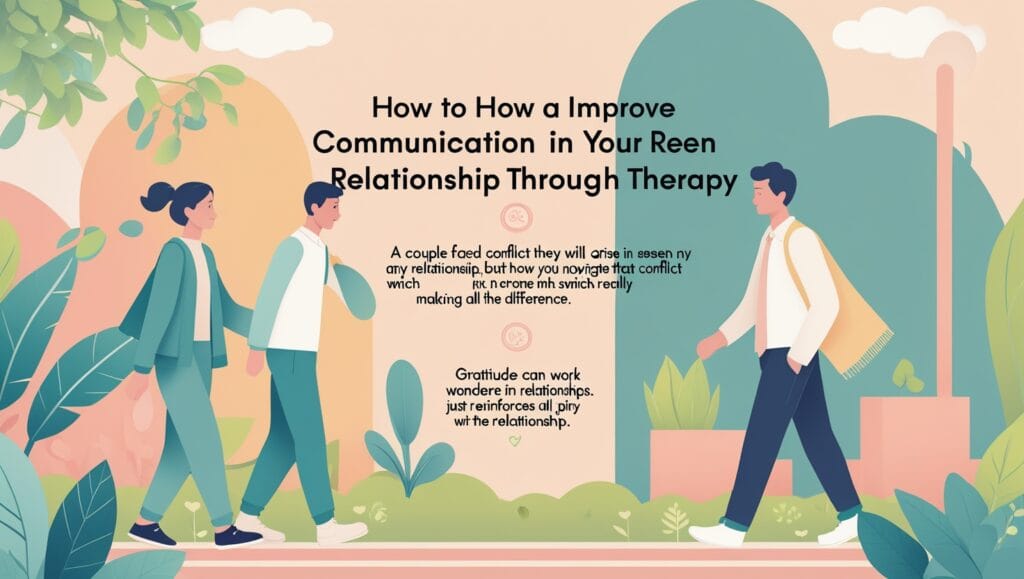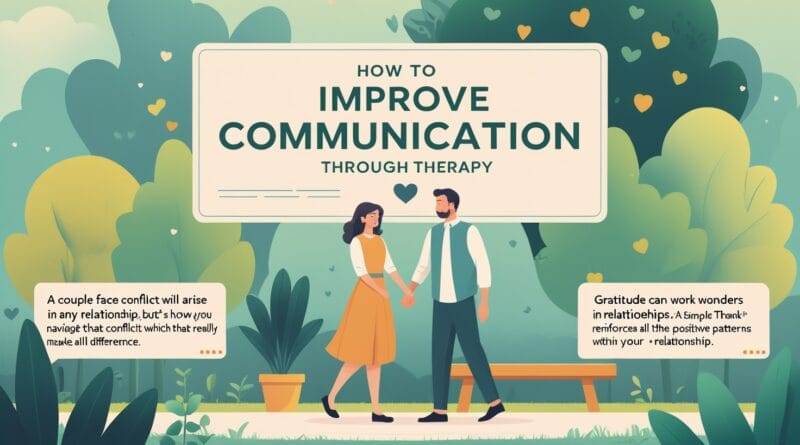How to Improve Communication in Your Relationship through Therapy
Good communication is always the backbone of any relationship. Yet, even the most loving couples find themselves at a point where they have no idea how to reach one another. If you’re facing a communications problem, you’re not alone, and therapy might be a potent tool that will build up deeper understanding, trust, and emotional closeness in your relationship.
This guide will explain how therapy can help improve communication between partners, what approaches therapists often use, and actionable advice you can implement today. We’ll also answer some commonly asked questions about couples therapy and communication issues to help you take the next step with confidence.
Why Communication Matters in Relationships
It means not only talking but also understanding each other. Poor communication can promote unnecessary conflicts, resentment, and emotional distance. The research carried out by The Gottman Institute specifies that “one of the most common reasons given for couples seeing therapy is that they do not feel they communicate well.”
These are not crisis relationships; these are relationships looking at ways to help strengthen their bond, understand feelings, and achieve healthy patterns of communication.
How Therapy Enhances Communication
Couples therapy is designed to address the unique dynamics between partners. Here’s how therapy can help transform communication in your relationship:
- Learning Active Listening
Most of us listen to reply, not to understand—a common pitfall in communication. Therapists teach active listening techniques, ensuring both partners feel heard and validated.
For example, active listening involves:
- Paraphrasing what your partner has said to confirm your understanding.
- Maintaining eye contact to show you’re fully present.
- Avoiding interruptions that derail the conversation flow.
- Addressing Emotional Triggers
Poor communication sometimes emanates from emotional triggers that have built up over time. Therapy helps couples understand this stuff and those unresolved issues that make them communicate in the ways they do. For instance, one partner shuts down in arguments since experiencing traumatic events; this makes the other feel neglected.
Therapists provide tools for reframing these triggers as opportunities for connection, not combat.

- Conflict Resolution Skills
Conflict will arise in any relationship, but it’s how you navigate that conflict which really makes all the difference. Therapists can help couples continue to be respectful during conflicts and work toward mutually agreeable solutions. The “gentle startup” of Gottman therapy helps couples address conflicts with positivity, rather than with blame, thereby de-escalating them. 4. Uncovering Negative Communication Patterns
The point is that particular habits-like constant criticism, defensiveness, or stonewalling-can give relationships a serious blow. With therapy, these patterns will be brought to light and exchanged for healthier ways of communicating. For example, instead of “You never do the dishes,” using “I” statements to state feelings and needs could be, “I feel overwhelmed when the dishes pile up. Can we make a plan for taking care of them?” 5. Building Emotional Intimacy
Beyond conflict, therapy promotes profound emotional bonding. As such, most therapists have strategies that aim to reestablish or build intimacy, such as mutual appreciation or returning to shared goals.
Frequently Asked Questions Regarding How Therapy Can Help to Improve Communications
To provide you with understanding regarding how therapy can improve communication, we have compiled answers to some of the most asked questions with regards to communication in therapy sessions.
- When Should We Consider Going for Therapies for Poor Communication?
You don’t need to have an enormous conflict to see a therapist. Couples therapy might be helpful if you feel unheard, if you interpret each other’s intentions wrong, or if you keep arguing about the same thing. It is also a very good prevention for newlyweds or couples entering new stages of life.
- How Long Does It Take to See Results in Therapy?
No two couples are alike, but most couples see positive changes fairly early in therapy. Some clients report that simple strategies, like listening, can make a big difference in the first few sessions.
- Can Therapy Help if My Partner Doesn’t Want to Come?
It is not atypical for one partner to resist therapy. If that is the case, try framing the possible benefits in terms of better understanding and less conflict. In cases of extreme resistance, individual therapy can also be a valuable way to learn better ways of communicating.

- What Forms of Therapy Emphasize Communication?
Therapists may use several structured techniques designed specifically for couples, including:
- Emotionally Focused Therapy-EFT: Emphasizes nurturing emotional connections.
- Gottman Method Therapy: Uses research-supported methods of improving communication and conflict regulation. • Cognitive Behavioral Therapy: Identifies and corrects harmful thinking patterns that impact communication. The choice of therapy modality will depend on both your specific needs and preferences. 5. Is It Possible to Have Therapy Online?
Yes! Modern technology makes online therapy sessions highly effective. Services like Regain and Talk space focus on couples therapy, offering flexibility to fit your schedule and preferences. Research has shown that online therapy can be just as effective as in-person sessions for improving communication.
How to Start Improving Communication Today
Even if you are not ready for therapy just yet, there are simple strategies you can start practicing to improve communication in your relationship.
- Practice Daily Check-Ins
Spend 10-15 minutes each day checking in with your partner. Ask open-ended questions like, “How was your day?” and actively listen to their responses.
- Set Aside Time for Intentional Conversations
This leads to either hurried or superficial conversations. Give time without distraction to discuss anything: finances, family, or future plans.
- Acknowledge Positive Behaviors
Gratitude can work wonders in relationships. A simple “Thank you for doing that” just reinforces all the positive patterns within your relationship.
- Use “I” Statements
Use “I” statements, which describe feelings and needs without blaming. Thus, “I feel stressed when we don’t plan ahead” is less likely to lead to defensiveness than “You never plan anything.”
- Read or Learn Together
Reading relationships books or attending workshops will teach you both new skills. Books such as “The Seven Principles for Making Marriage Work” by John Gottman are very good to go through together.
Connect Better with Therapy
Communication is a process that happens in steps and is worth investing in emotionally for intimacy, understanding, and resolving conflicts. Be it a newly wedded couple, an embattled one, or one looking forward to strengthening the foundation of their relationship, therapy offers a secure environment to learn and grow together.
If you are ready to take that final step, find a licensed therapist, or access online platforms like Regain, specializing in relationship-focused therapy. Remember, investing in communication means you are addressing the heartbeat of your relationship.

